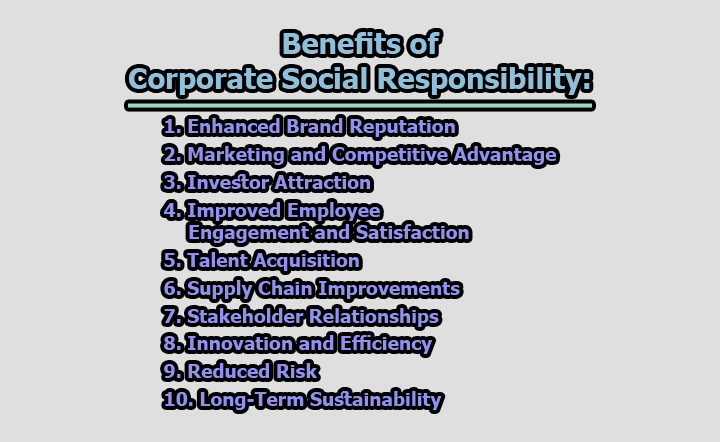Corporate Social Responsibility (CSR) has become a fundamental aspect of contemporary business practices. In an era where societal and environmental concerns are increasingly intertwined with the world of commerce, companies are recognizing the need to extend their responsibilities beyond profit-making. CSR, in essence, is a proactive approach whereby businesses voluntarily embrace social and environmental obligations, striving to contribute positively to the greater good. This article explores the main types and benefits of corporate social responsibility, shedding light on how it shapes modern businesses and their impact on society and the environment.
What is Corporate Social Responsibility (CSR)?
Corporate Social Responsibility (CSR) is a business approach that involves companies voluntarily integrating social and environmental concerns into their operations and decision-making processes. It goes beyond the primary goal of profit-making to consider the broader impact of business activities on society and the environment. So, CSR is about businesses taking responsibility for their impact on society and striving to make a positive contribution through ethical, sustainable, and socially responsible practices.
Types of Corporate Social Responsibility:
Corporate Social Responsibility (CSR) encompasses various facets of a company’s commitment to ethical and responsible business practices. There are four main types of CSR, each with its own focus and objectives:
1. Environmental Responsibility: Environmental Responsibility involves a company’s commitment to minimizing its environmental footprint and promoting sustainability. This type of CSR includes various activities such as:
a) Reducing Carbon Emissions: Companies may set targets to reduce their greenhouse gas emissions through energy-efficient practices, adoption of renewable energy sources, and carbon offset programs.
b) Resource Conservation: This entails responsible management of natural resources such as water, forests, and minerals. It often involves initiatives to reduce water consumption, promote recycling, and minimize waste.
c) Responsible Sourcing: Companies aim to use materials and resources that are sustainably and ethically sourced. This may involve fair trade practices and avoiding materials from endangered sources.
d) Environmental Innovation: Encouraging research and development into eco-friendly technologies and practices is part of environmental responsibility. This includes developing products that have a lower environmental impact.
2. Ethical Responsibility: Ethical Responsibility focuses on conducting business with integrity, fairness, and respect for human rights. Key aspects include:
a) Fair Labor Practices: Ensuring fair wages, safe working conditions, and equitable treatment for employees. Companies should adhere to labor laws and international labor standards.
b) Human Rights Compliance: Respecting and promoting human rights in the supply chain and business operations, especially in regions with a history of human rights abuses.
c) Corporate Governance: Maintaining transparent and ethical corporate governance practices, including accurate financial reporting and responsible executive compensation.
d) Consumer and Stakeholder Relations: Companies should engage with consumers and stakeholders honestly and responsibly, addressing concerns and feedback in a forthright manner.
3. Philanthropic Responsibility: Philanthropic Responsibility involves a company’s commitment to giving back to society. This may include:
a) Charitable Donations: Companies contribute to charitable organizations and causes, often aligned with their values and mission. Donations may support education, healthcare, poverty alleviation, disaster relief, and more.
b) Community Engagement: Companies engage in community initiatives through volunteering, sponsorships, and partnerships to address local issues and improve the quality of life in the areas where they operate.
c) Employee Volunteer Programs: Encouraging and supporting employees in their efforts to volunteer and give back to the community.
d) Corporate Foundations: Some companies establish their own foundations to coordinate and formalize philanthropic activities and charitable giving.
4. Economic Responsibility: Economic Responsibility forms the foundation of CSR and involves the financial stability and profitability of a company. Key elements include:
a) Financial Viability: Companies must ensure their long-term financial stability to fulfill their other CSR obligations. This includes prudent financial management and risk assessment.
b) Compliance with Laws and Regulations: Adhering to all relevant laws and regulations in the jurisdictions where a company operates is a fundamental aspect of economic responsibility.
c) Shareholder Value: Maintaining shareholder value and ensuring a fair return on investment is a primary goal. Companies should be responsible stewards of shareholders’ capital.
d) Business Ethics: Companies must conduct their operations with high ethical standards, avoiding fraud, corruption, and unfair business practices.
Benefits of Corporate Social Responsibility:
Most firms embrace CSR due to moral convictions, which can result in several benefits and important social change.
1. Enhanced Brand Reputation: CSR initiatives can significantly boost a company’s brand reputation. When a company engages in socially responsible activities, it demonstrates a commitment to making a positive impact on society. This fosters trust and goodwill among consumers and the public, which can translate into increased brand loyalty and positive word-of-mouth marketing.
2. Marketing and Competitive Advantage: CSR serves as a powerful marketing tool. It allows a company to differentiate itself from competitors by showcasing its commitment to social and environmental issues. This can attract consumers who prefer to support businesses with a strong CSR track record. It can also be an effective way to appeal to conscious consumer segments and stand out in the marketplace.
3. Investor Attraction: Many investors, particularly those focused on socially responsible or ethical investment, are drawn to companies with strong CSR practices. By demonstrating a commitment to sustainability and responsible business conduct, companies can attract a broader base of investors and potentially access additional funding opportunities.
4. Improved Employee Engagement and Satisfaction: CSR initiatives can positively impact the workplace environment. Employees often take pride in working for a socially responsible organization, and this can lead to increased job satisfaction and engagement. A satisfied and engaged workforce is more productive and less likely to seek employment elsewhere, reducing turnover rates.
5. Talent Acquisition: CSR can be a powerful tool for attracting top talent. Many job seekers are looking for employment with organizations that align with their personal values and ethical principles. Companies with robust CSR programs are more likely to attract employees who share the same convictions and are motivated by a sense of purpose beyond financial gain.
6. Supply Chain Improvements: CSR initiatives inherently encourage businesses to examine their supply chain practices. This includes scrutinizing sourcing practices, evaluating the environmental and social impact of suppliers, and ensuring ethical treatment of workers throughout the supply chain. This can lead to improvements in supply chain efficiency, transparency, and sustainability.
7. Stakeholder Relationships: Engaging in CSR fosters positive relationships with various stakeholders, including customers, employees, suppliers, regulators, and local communities. These relationships are crucial for long-term business success and can lead to beneficial partnerships and collaborations.
8. Innovation and Efficiency: Pursuing CSR often stimulates innovation and operational efficiency. Companies look for ways to reduce their environmental impact, which can result in cost savings. It can also lead to the development of sustainable products and services that appeal to environmentally conscious consumers.
9. Reduced Risk: Engaging in CSR can help mitigate certain risks, such as reputation damage due to unethical behavior or environmental violations. It also demonstrates a company’s commitment to adhering to regulations and ethical standards, reducing the likelihood of legal and regulatory issues.
10. Long-Term Sustainability: By addressing social and environmental issues through CSR, companies contribute to a more sustainable and equitable society. This long-term perspective is essential for ensuring the prosperity of businesses and communities alike.
In conclusion, in a world where the lines between business and society are ever more blurred, Corporate Social Responsibility has emerged as a crucial strategy. Companies embracing CSR are not only fulfilling their ethical obligations but are also reaping a host of tangible benefits. These encompass improved brand reputation, enhanced stakeholder relationships, and a more motivated workforce. Moreover, CSR allows businesses to demonstrate their commitment to addressing global challenges, from climate change to social inequality. As the business landscape continues to evolve, it is clear that CSR is not merely an option but a fundamental driver of success, fostering a world where profit and purpose go hand in hand.

Library Lecturer at Nurul Amin Degree College










